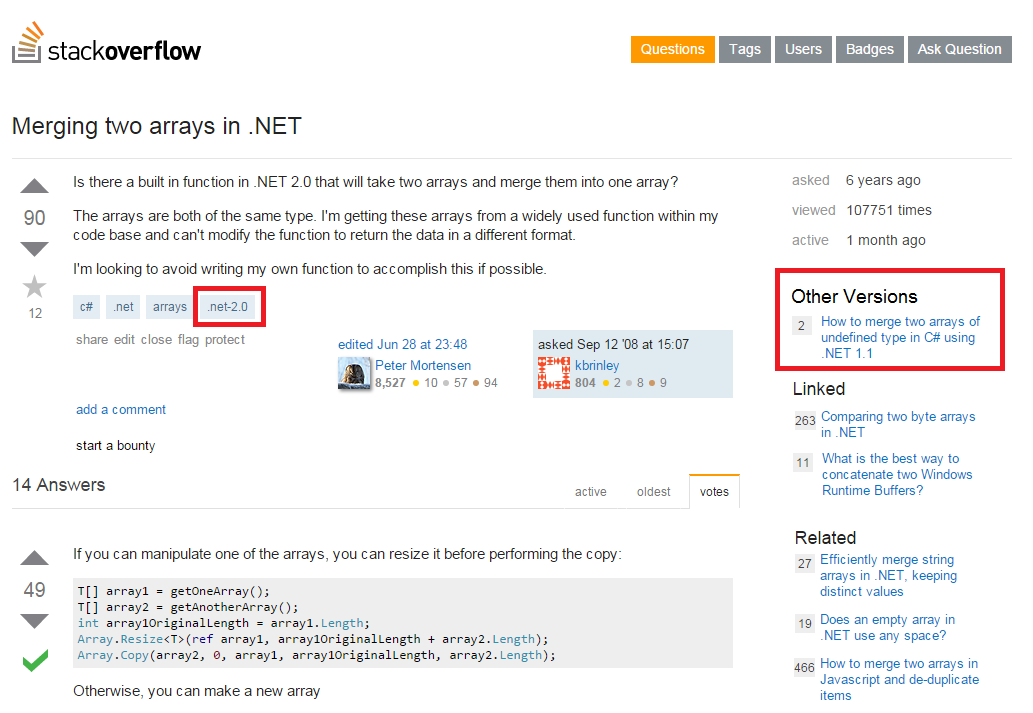As the network ages and we have answers that are 7+ years old, we run into situations where changes in technology, etc. result in a once great answer becoming out-of-date, obsolete, or somewhat problematic. We don’t want to lose or delete these answers, due to legacy applications that still need the code but we need to figure out the right way to handle them.
This has been brought up and discussed many, many, many times over the years, and the community seems to suggest the following steps to update these answers:
- Comment to the OP suggesting that their answer is out-of date and needs to be updated
- Post a new answer with the updated information
- Edit or suggest an edit (if you don’t have privileges) to correct the answer
There are pros and cons to each one of these, and I’m going to outline a few of them here:
Adding a Comment:
What if the user is no longer active on the site? They won’t get the notification to update and then it’s up to someone else to potentially edit the answer.
What if the user gets notification and disagrees that the answer is wrong, so they don’t edit it. Now we have a conflict between the original author and another user on the validity of an answer, how do we proceed?
Posting a New Answer:
This is a great solution to the above problem when the original author doesn’t want to edit their obsolete answer, but we run into the “sorting problem” where the highly-upvoted, accepted answer appears above an up-to-date answer. The hope is that eventually this new answer will gain enough upvotes to move up the list and will be easily visible to people with the same question.
Editing or Suggesting an Edit
This is where we have the biggest issue when it comes to improving out-of-date or obsolete answers. Editing posts is encouraged on all sites and it’s even a privilege that is earned. The help center explicitly states
When should I edit posts?
.... to correct minor mistakes or add addendums / updates as the post ages
Users are advised to make these edits, yet this seems to be a stumbling block.
Why, you ask, do I see it as a stumbling block?
Several reasons...
First, when a user doesn’t have full edit privileges it goes to the review queue where these edits can be rejected. If the edit is substantial enough, there is even a rejection reason provided:
This edit deviates from the original intent of the post. Even edits that must make drastic changes should strive to preserve the goals of the post's owner.
With the rejection we lose the proposed fix and are back at the start, with an answer that needs a bit of tending to.
If a user has full edit privileges, they can make a sizable edit without review to bring it up-to-date but if there are code changes users are told not to touch the code.
As you see, we have a disconnect. Users are told to edit and we have posts that need to be edited. But no one wants or is able to edit them, because they might alter code which is a big no-no when the answer is not a community-wiki.
What do we do? What can we do to fix this?
We’re taking a good hard look at how we should handle answers that were once great but need some gardening to keep them that way. Lots of things have been suggested over the years, but so far nothing has been implemented:
Implement a vote-based warning system for potentially dangerous answers
Can we exempt downvoted accepted answers from getting the top spot?
Deemphasise the accept mark if there's an answer the community strongly prefers?
Before we do anything we want some feedback and a discussion from the community on how we can encourage these edits to these answers (we disagree internally as well).
Would you be more likely to edit them into something no longer obsolete, if they were made community wikis? Should we add a post notice that it’s obsolete or out-of-date? Figure out some way to give rep to the user who makes a substantial edit? Something else that we haven’t thought of?




